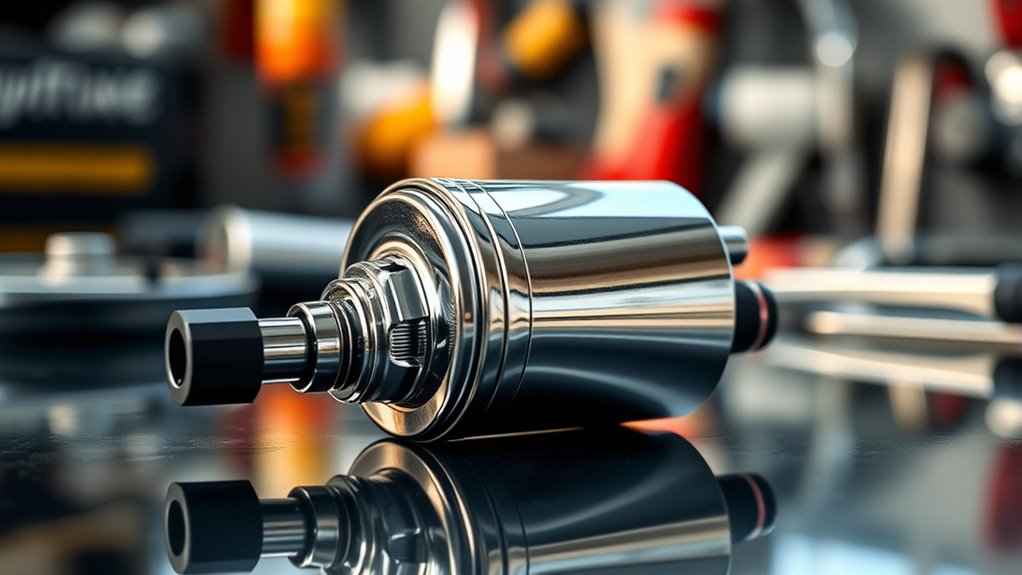If you’re looking for the 14 best low-pressure fuel pumps for reliable performance in 2025, I recommend considering models that suit your specific needs, whether for small engines, fuel transfer, or OEM replacements. Look for pumps with proven durability, proper flow rates, and compatibility with your fuel type. Many units include features like built-in check valves and filters, making installation easier. Keep reading to discover detailed insights and the top picks for every application.
Key Takeaways
- Prioritize pumps with a flow rate of 28-90 GPH and pressure of 2.5-9 PSI for small engine and carbureted systems.
- Select models with durable materials like stainless steel or zinc for enhanced longevity and reliability.
- Ensure compatibility with your fuel type, avoiding ethanol-blended fuels unless specified by the manufacturer.
- Look for units with built-in check valves, filters, and easy installation features for consistent performance.
- Consider customer reviews and brand reputation to identify pumps with proven durability and minimal early failure issues.
Electric Fuel Pump 12V Universal Low Pressure Fuel Pump
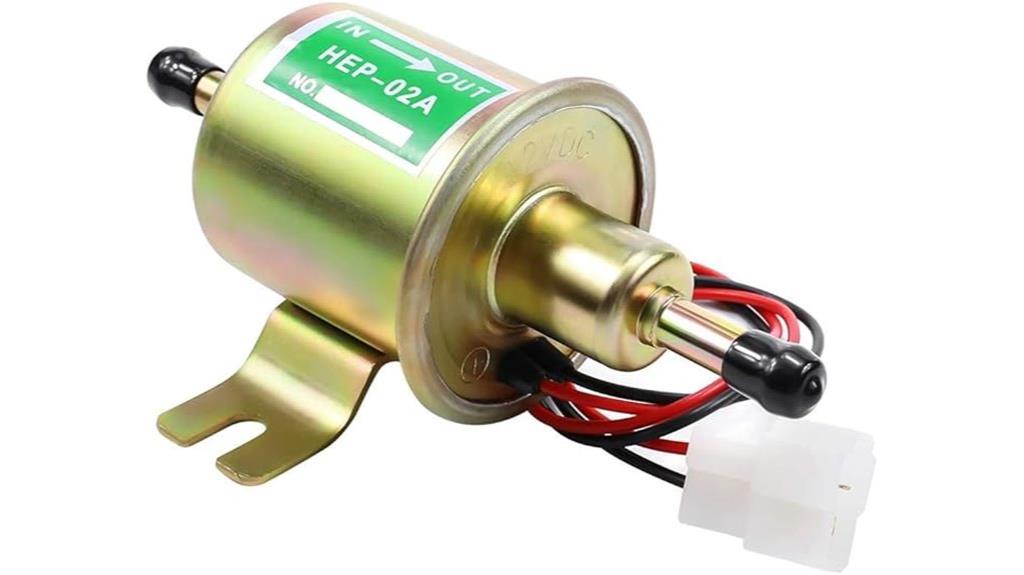
If you’re looking for a reliable low-pressure fuel pump that’s easy to install and versatile enough for various small engine applications, the Electric Fuel Pump 12V Universal Low Pressure Fuel Pump is an excellent choice. I’ve used it for lawnmowers, ATVs, and small boats, and it consistently delivers steady fuel flow at 2.5-4 psi with a 30 GPH flow rate. Its compact brass body is lightweight and easy to mount almost anywhere, thanks to its simple two-wire setup and built-in check valve. Whether replacing a faulty pump or adding auxiliary fuel transfer, I find it reliable, cost-effective, and straightforward to install, making it a practical upgrade for many small engine projects.
Best For: DIY enthusiasts and small engine users seeking an affordable, easy-to-install low-pressure fuel pump for lawnmowers, ATVs, boats, and other 12V-powered equipment.
Pros:
- Easy to install with two-wire operation and built-in check valve for reliable fuel delivery
- Compact, lightweight, brass body suitable for various mounting positions
- Cost-effective solution that improves engine start-up and reduces surging
Cons:
- Max pressure unknown; may require a regulator for sensitive carburetors
- Some units may experience early failure or quality issues; inspect before installation
- Larger dimensions and mounting legs may limit placement options in tight spaces
Electric Fuel Pump 12V, Self-Priming In-Line Pump for Gas/Diesel Engines
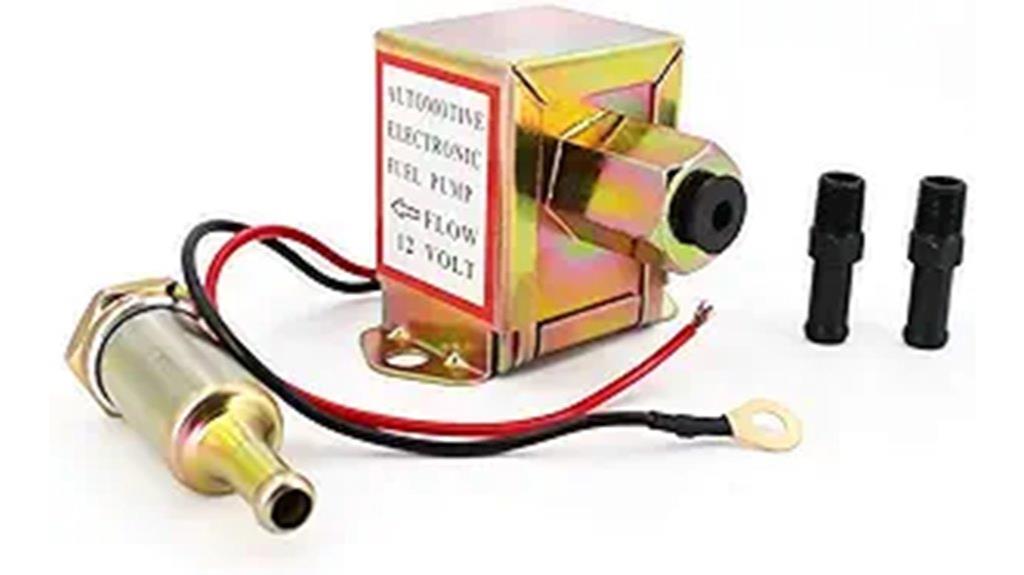
The Electric Fuel Pump 12V, Self-Priming In-Line Pump is an excellent choice for DIY enthusiasts and vehicle owners seeking a reliable, versatile solution for fuel transfer. Its self-priming design guarantees easy startup, while its durable copper construction provides stable fuel flow. Compatible with gasoline and diesel engines across cars, trucks, boats, and generators, it offers a flow rate of up to 90 L/h at 4.5-7 PSI. Compact and easy to install, it fits in tight spaces, whether in-line or in-tank. Customers praise its quiet operation and straightforward setup, making it a practical, cost-effective option for various fuel transfer needs.
Best For: DIY vehicle owners, mechanics, and hobbyists needing a reliable, easy-to-install fuel transfer pump for cars, trucks, boats, or generators.
Pros:
- Self-priming design ensures quick and easy startup without manual assistance
- Durable copper construction provides stable and consistent fuel flow
- Compact size allows for versatile installation in tight spaces and various setups
Cons:
- Some users report pump failure within hours of use, indicating potential reliability issues
- Noise level can be noticeable, especially in quieter environments or for certain applications
- May require a fuel regulator for optimal performance in specific systems or vehicles
Electric Fuel Pump 12V Universal Low Pressure
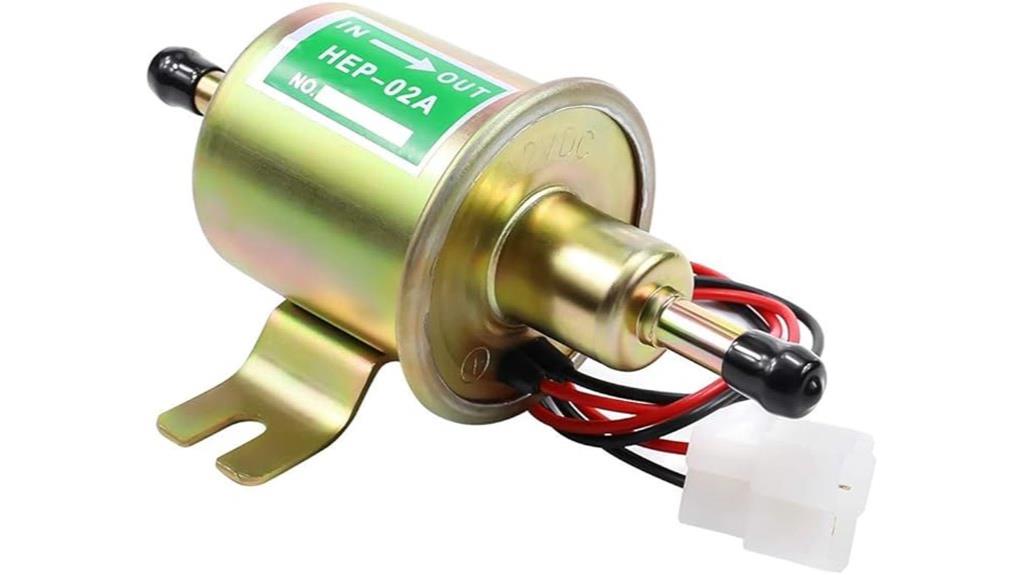
Designed to provide reliable low-pressure fuel delivery, the Electric Fuel Pump 12V Universal Low Pressure stands out as an ideal choice for small engine applications. Its compact brass body and lightweight design (just 10.9 oz) make installation straightforward on lawn mowers, ATVs, boats, and generators. Operating at 2.5-4 psi with a flow rate of 30 GPH, it efficiently transfers fuel from tanks or boosts pressure. The two-wire setup, built-in check valve, and versatile mounting options ensure easy integration. Suitable for various fuels, it’s a cost-effective solution to replace or supplement existing pumps, enhancing engine performance and reliability.
Best For: Small engine owners and DIY enthusiasts seeking a reliable, low-pressure electric fuel pump for lawnmowers, ATVs, boats, or generators.
Pros:
- Compact, lightweight brass body for easy installation and portability
- Versatile, compatible with various fuels and small engine applications
- Simple two-wire operation with built-in check valve for reliable fuel delivery
Cons:
- Max pressure is unknown; risk of flooding if pressure exceeds engine specifications
- Some units may have quality issues such as poor welds or early failure
- Size and mounting legs may require space verification before installation
Universal Electric Fuel Pump Kit (12V, 3-6 PSI) with Fuel Line
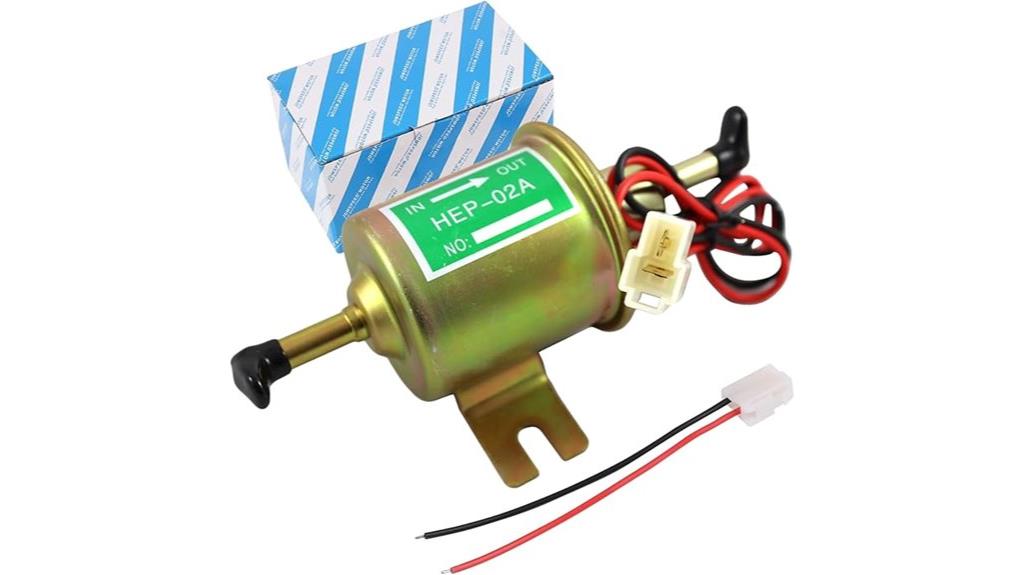
For those seeking a reliable, versatile fuel pump for small engines and low-pressure applications, the Universal Electric Fuel Pump Kit (12V, 3-6 PSI) stands out. It’s compatible with gasoline and diesel, featuring a durable metal construction and easy mounting options. The kit includes a 6.56-foot fuel line, fuel filter, and wiring for straightforward installation. With a flow rate over 70 L/H and pressure of 3-6 PSI, it’s perfect for RV generators, small engines, and carbureted systems. While affordable and lightweight, some users report a limited lifespan, requiring replacement after a season for continuous use. It’s a solid temporary solution for fuel transfer needs.
Best For: DIY enthusiasts and small engine users needing an affordable, easy-to-install low-pressure fuel pump for RVs, generators, boats, or lawn equipment.
Pros:
- Simple installation with straightforward wiring and mounting options
- Compatible with gasoline and diesel, suitable for various small engines
- Lightweight, durable metal construction with a high flow rate of over 70 L/H
Cons:
- Limited lifespan; may need replacement after a single season under continuous use
- Can experience flow and pressure reduction over time
- Not designed for high-pressure applications or heavy-duty long-term operation
Electric 12V Fuel Pump for Gas and Diesel Transfer
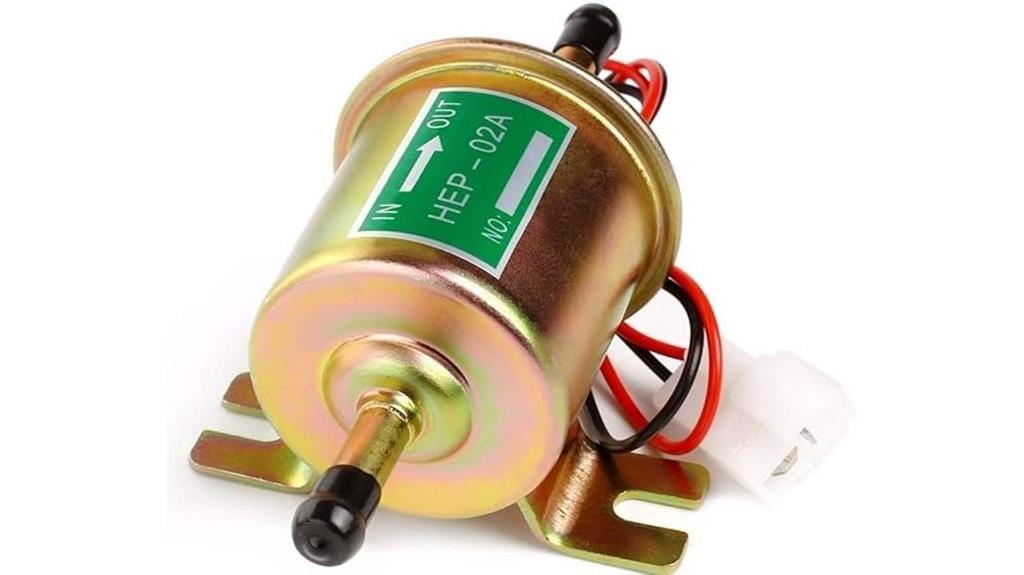
If you need a reliable solution for transferring gas or diesel with consistent flow, the Electric 12V Fuel Pump is an excellent choice. With a low-pressure output of 2.5-4 PSI, it guarantees smooth fuel transfer without over-pressurizing your system. Its universal design fits all 12V vehicles and devices, including cars, trucks, boats, lawnmowers, and generators. The pump features an 8mm inlet and outlet, with internal valving that prevents backflow, ensuring steady, reliable operation. Plus, it comes with a 2-year warranty, giving you peace of mind. This pump provides strong suction, making fuel transfer quick, efficient, and dependable for various applications.
Best For: DIY enthusiasts, vehicle owners, and professionals needing reliable gas or diesel transfer solutions for cars, boats, generators, and lawn equipment.
Pros:
- Universal compatibility with all 12V vehicles and devices
- Internal valving prevents backflow for steady operation
- Comes with a 2-year warranty for peace of mind
Cons:
- Low-pressure output may not suit high-flow transfer needs
- May require additional fittings for certain setups
- Not suitable for high-pressure fuel systems
CarBole Micro Electric Fuel Pump (E8012S)
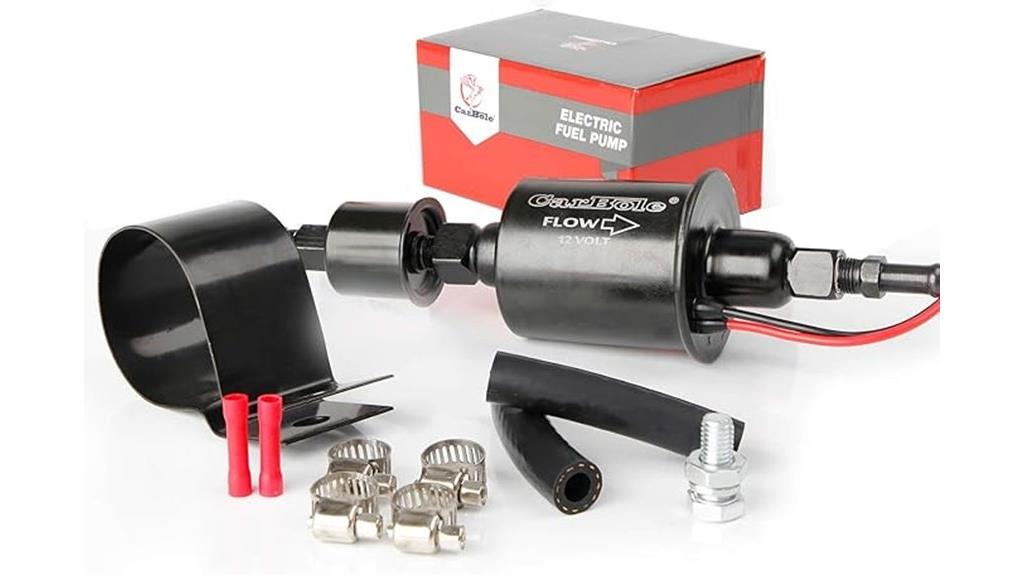
The CarBole Micro Electric Fuel Pump (E8012S) stands out as an excellent choice for those seeking a reliable, compact pump capable of handling various gasoline and diesel engines without alcohol. It operates at 12V, delivering 30 GPH flow with 5-9 PSI pressure, making it suitable for cars, trucks, boats, and industrial uses. Its piston-style, inline design features a zinc-coated cast iron body and rubber components for durability. Weighing just over a pound, it offers steady, quiet fuel flow and can last up to 24,000 miles. Overall, it’s a versatile, performance-grade pump ideal for maintaining consistent fuel delivery in multiple applications.
Best For: DIY enthusiasts and professionals seeking a reliable, compact fuel pump for gasoline and diesel engines without alcohol, suitable for automotive, marine, and industrial applications.
Pros:
- Compact and lightweight design (just over a pound) for easy installation and flexible use
- Steady, quiet operation with a lifespan of up to 24,000 miles, ensuring durability
- Compatible with a wide range of vehicles and industrial equipment, supporting both gasoline and diesel (non-alcohol) engines
Cons:
- Only suitable for non-alcohol fuels, limiting versatility with ethanol-blended fuels
- Inlet and outlet connections require precise sizing and mounting, which may need additional fittings or modifications
- No built-in filtering mechanism; a filter must be added separately to ensure optimal performance
Inline 12V Electric Fuel Pump for Gas and Diesel
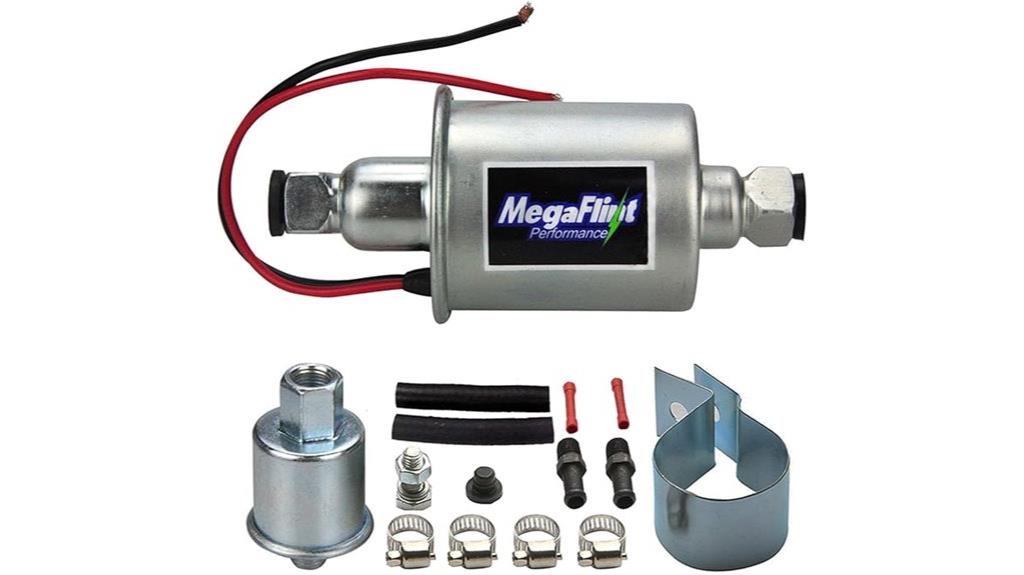
An inline 12V electric fuel pump is an ideal choice for anyone seeking a reliable, low-pressure solution compatible with both gas and diesel engines. It delivers 5-9 PSI and flows at 30 GPH, making it perfect for various applications. Its universal design fits all 12-volt cars, trucks, boats, and generators. Built with a German copper coil for durability, it’s mechanically tested for performance and quality. With a two-year warranty and certified standards, this pump offers peace of mind. Its high suction capability ensures consistent fuel delivery, making it a versatile and dependable option for those needing a low-pressure, durable fuel pump.
Best For: vehicle owners and DIY enthusiasts seeking a reliable, versatile low-pressure fuel pump compatible with gas and diesel engines across various 12V applications.
Pros:
- Universal fit for all 12V cars, trucks, boats, and generators.
- Durable German-made copper coil and high-quality construction.
- Mechanically tested and backed by a two-year warranty for peace of mind.
Cons:
- Designed specifically for low-pressure applications, not suitable for high-pressure fuel systems.
- May require additional fittings or adapters depending on vehicle setup.
- Flow rate and pressure may not meet the needs of high-performance or specialized fuel systems.
CarBole Universal Electric Fuel Pump 12V

Looking for a reliable low-pressure fuel pump compatible with carbureted engines and various small engines? The CarBole Universal Electric Fuel Pump 12V is a solid choice. It operates at 2-3.5 PSI with a flow rate of 28 GPH, suitable for carbureted systems in cars, boats, lawn mowers, and generators. Made from zinc with a machined exterior, it features an inner valve to prevent backflow and delivers stable, quiet operation. Designed for 12V systems, it’s easy to install with included kits. Just note, it’s not suitable for alcohol-based fuels or fuel-injected engines, but it’s versatile and reliable for many small engine applications.
Best For: hobbyists and small engine owners seeking a reliable, low-pressure fuel pump for carbureted engines, boats, lawn mowers, and generators.
Pros:
- Easy to install with included mounting kits and fuel filter
- Quiet operation with stable fuel flow and backflow prevention
- Compatible with various fuels like gasoline, pump gas, and race gas
Cons:
- Not suitable for alcohol-based fuels such as E85 or ethanol
- Designed only for 12V systems, not compatible with fuel-injected engines
- Potential durability issues if not properly installed or if used with high-pressure systems
CarBole Gasoline Electric Fuel Pump, Universal 5/16 Inch Inlet/Outlet, 12V, 1-2A, 28GPH
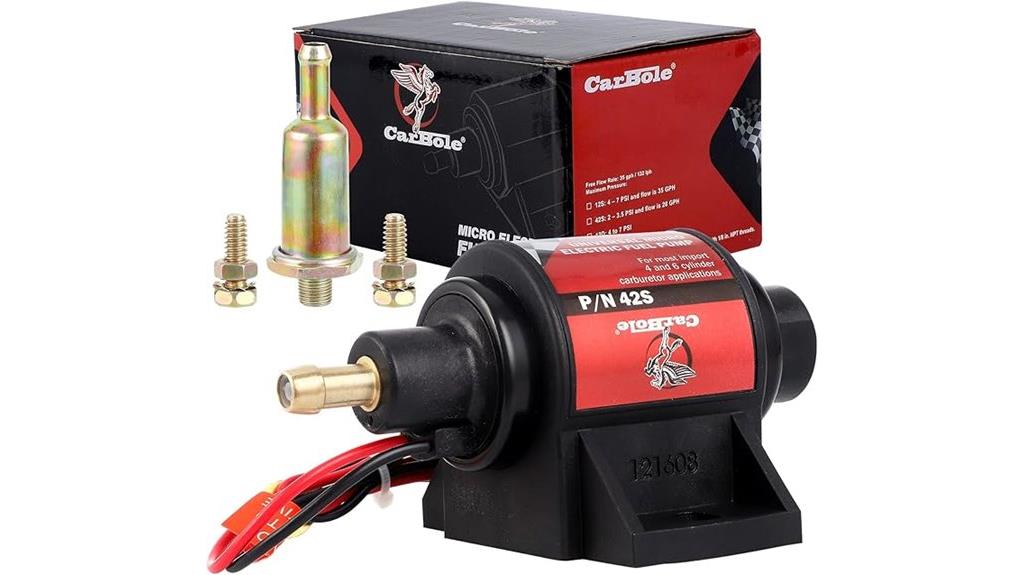
If you’re seeking a reliable and budget-friendly fuel pump for small automotive projects or modifications, the CarBole Gasoline Electric Fuel Pump is an excellent choice. It’s a universal 12V inline pump with 5/16-inch inlet and outlet fittings, suitable for cars, trucks, boats, and generators. With a flow rate of 28 GPH and operating at 2-3.5 PSI, it works well in carbureted systems. Made from cast iron and rubber, it’s durable and easy to install, thanks to its flange mount and simple two-wire design. While some users report early failures, proper installation and using a filter can extend its lifespan, making it a solid budget option.
Best For: budget-conscious automotive enthusiasts and DIYers seeking a reliable, easy-to-install fuel pump for small projects, carbureted systems, or vehicle modifications.
Pros:
- Easy to install with a simple two-wire design and flange mounting.
- Quiet operation compared to traditional vacuum or noisy electric pumps.
- Cost-effective solution with good performance for short-term use.
Cons:
- Reports of early failure or motor burnout after a few months of use.
- Not suitable for E85, ethanol, methanol, or watery liquids.
- Limited durability, requiring potential replacements for long-term reliability.
E8012S Electric Fuel Pump, 12V Inline Low Pressure Pump
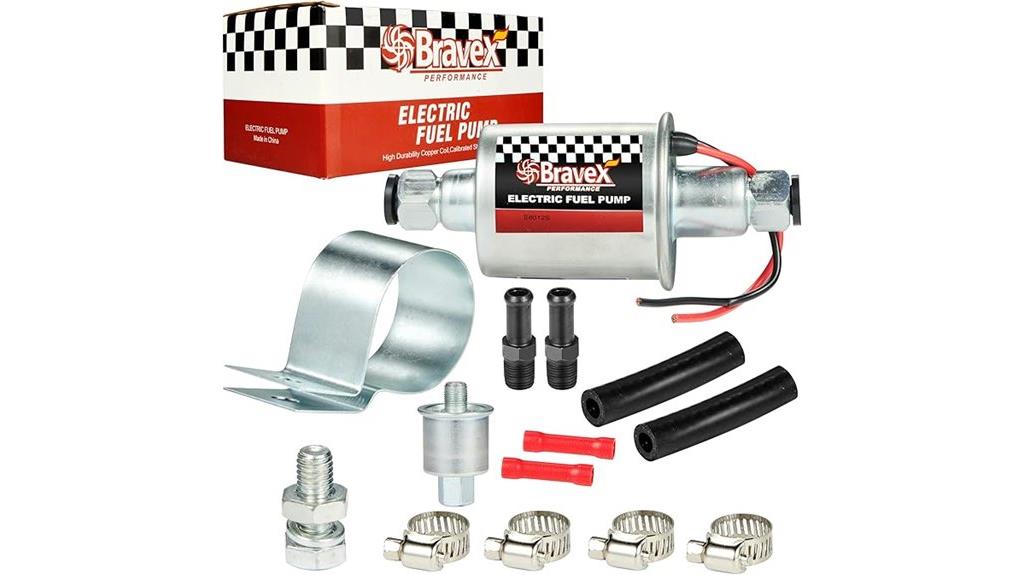
The E8012S Electric Fuel Pump stands out as an ideal choice for those needing a reliable, low-pressure inline pump compatible with a wide range of 12V vehicles and small engines. It operates at 5-9 PSI, making it perfect for carburetors, lawn mowers, and transfer applications. Its zinc body and durable metal construction guarantee longevity, while the two-wire design allows easy installation anywhere. Suitable for gasoline, it can handle suction heights up to 12 inches. With a 12-amp fuse and a lightweight build, this pump offers consistent performance and flexibility, making it a versatile option for various low-pressure fuel delivery needs.
Best For: DIY enthusiasts, small engine operators, and vehicle owners needing a reliable low-pressure gasoline pump for carburetors, lawn mowers, and transfer tasks.
Pros:
- Durable zinc body and metal construction for long-lasting performance
- Easy two-wire installation adaptable to various setups
- Suitable for gasoline with a maximum suction height of 12 inches
Cons:
- Limited to low-pressure applications (5-9 PSI) only
- May not be compatible with high-pressure fuel systems or diesel fuel
- Requires a 12-amp fuse, adding an extra component to the installation
Facet-Purolator Solid State Fuel Pump Kit 12V

The Facet-Purolator Solid State Fuel Pump Kit 12V stands out as an ideal choice for those upgrading or replacing their carburetor-equipped vehicles, vans, or light trucks with a reliable, compact pump. It operates at 12V, delivering 25 GPH with a shut-off pressure between 1.5 and 4 PSI, suitable for diesel and gasoline. Its corrosion-resistant stainless steel body and threaded connections guarantee durability and easy installation. Compatible with many classic and modern vehicles, it meets OEM standards and features UL and reverse polarity protection. While loud, it’s praised for reliability, improved engine startup, and ease of use, making it a popular aftermarket upgrade.
Best For: DIY enthusiasts and vehicle owners seeking a reliable, compact fuel pump replacement for carbureted cars, vans, light trucks, and small engines that require a durable, 12V solid-state solution.
Pros:
- Durable stainless steel body resistant to corrosion and fuel exposure
- Reliable operation with OEM-standard fit and performance
- Easy to install with threaded connections and vehicle-specific design
Cons:
- Not suitable for high-pressure fuel systems beyond 4 PSI
- Noted for being loud during operation, which may require noise mitigation
- Discontinued by the manufacturer, potentially limiting availability of new units
Universal Electric Fuel Pump Kit (12V, 3-6 PSI) with Fuel Line and Filter
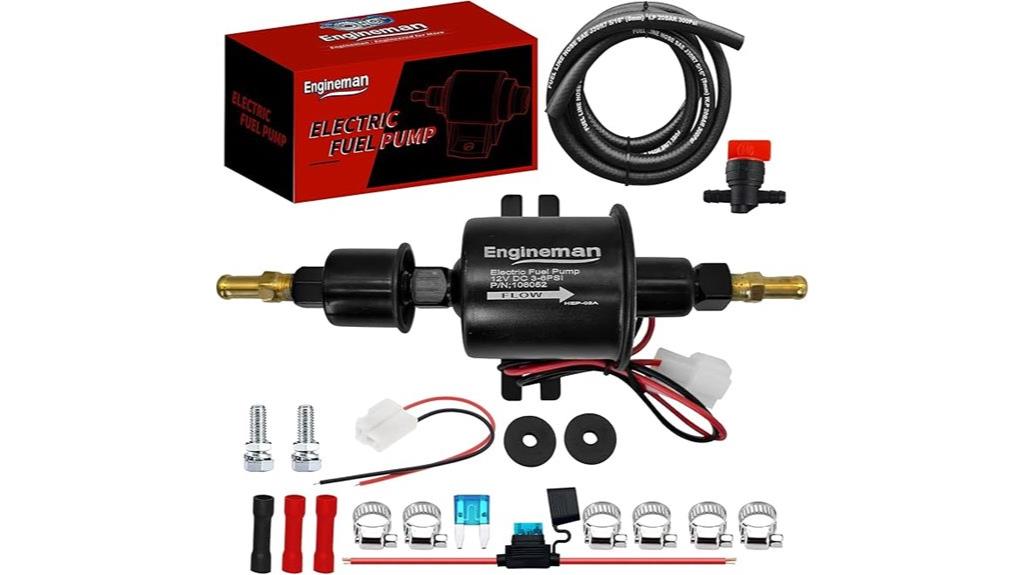
Designed for versatile fuel transfer, the Universal Electric Fuel Pump Kit (12V, 3-6 PSI) with Fuel Line and Filter is an ideal choice for DIY enthusiasts and professionals seeking a reliable, easy-to-install solution. It fits all 12-volt vehicles, including cars, trucks, boats, and small engines, handling gasoline and diesel (excluding E85). With a flow rate up to 30 GPH and a stable 3-6 PSI output, it ensures efficient fuel movement. The kit includes a durable pump, fuel line, filters, clamps, and wiring for quick setup. Its high-quality construction and resistance to extreme temperatures make it dependable across various environments.
Best For: DIY enthusiasts and professionals needing a reliable, versatile fuel transfer solution for various 12V vehicles and small engines.
Pros:
- Easy to install with comprehensive kit including wiring, clamps, and filters
- Durable construction with high-quality copper motor components and resistant fuel line
- Suitable for multiple applications, handling both gasoline and diesel (excluding E85)
Cons:
- Not compatible with alcohol-based fuels like E85
- Low-pressure output (3-6 PSI) may not suit high-performance or specialized fuel systems
- Requires proper filtration and setup to ensure optimal performance
CarBole Universal 12V Fuel Pump for Cars, Trucks, Boats

If you’re looking for a versatile fuel pump that works across various vehicles and applications, the CarBole Universal 12V Fuel Pump stands out. It’s suitable for cars, trucks, and boats, delivering a steady flow of 30 GPH at 7-9 PSI. Made from durable zinc and copper, it includes a filter and mounting kit for easy installation. Its built-in check valve prevents backflow, ensuring reliable fuel delivery. Designed for low-pressure needs, it’s ideal for carbureted engines, generators, and other applications where consistent fuel flow is essential. Just keep in mind, it’s not compatible with fuel-injected engines or alcohol-based fuels like E85.
Best For: DIY enthusiasts and vehicle owners needing a reliable, low-pressure fuel pump for carbureted engines, boats, or generators that require steady fuel flow without the need for fuel injection compatibility.
Pros:
- Easy to install with included mounting kit and filter for versatile placement
- Built-in check valve prevents backflow, ensuring consistent fuel delivery
- Compatible with a wide range of vehicles and applications operating at 12V
Cons:
- Not suitable for fuel-injected engines or alcohol-based fuels like E85
- Limited to low-pressure applications (7-9 PSI), unsuitable for high-pressure fuel systems
- Cannot be used with fuel types that are not compatible, such as ethanol-blended fuels
CarBole 12 Volt Electric Fuel Pump 5-9 PSI, 35 GPH for Gasoline Engines
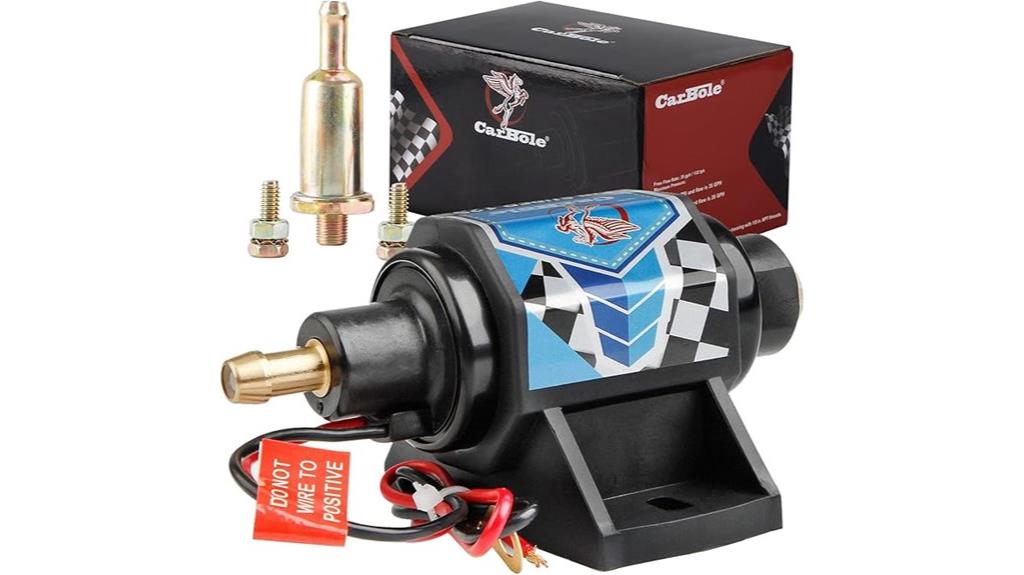
For those working on carbureted engines or needing a reliable fuel transfer solution, the CarBole 12 Volt Electric Fuel Pump offers a practical choice. It delivers 5-9 PSI at 35 GPH, making it suitable for gasoline engines with 4, 6, or 8 cylinders. Made from cast iron and rubber, it’s compact and easy to install near the fuel tank, with 5/16-inch connections. Users appreciate its quick startup and affordability, though some note pressure drops or durability issues over time. It’s ideal for siphoning, boosting fuel flow, or backup use, but requires proper mounting and pressure regulation to avoid damaging carburetors.
Best For: DIY enthusiasts and vehicle owners with carbureted gasoline engines who need a reliable, affordable fuel pump for siphoning, boosting fuel flow, or backup applications.
Pros:
- Quick startup with immediate fuel delivery and adequate pressure for carbureted engines.
- Compact, lightweight design easy to install near the fuel tank or on the frame.
- Cost-effective solution suitable for 4, 6, and 8-cylinder carburetor setups.
Cons:
- Not compatible with fuel-injected systems or alternative fuels like diesel, ethanol, or methanol.
- Potential for pressure drops over time and durability issues with some units.
- Requires proper mounting and pressure regulation to prevent damage to carburetors.
Factors to Consider When Choosing Fuel Pumps Low Pressure
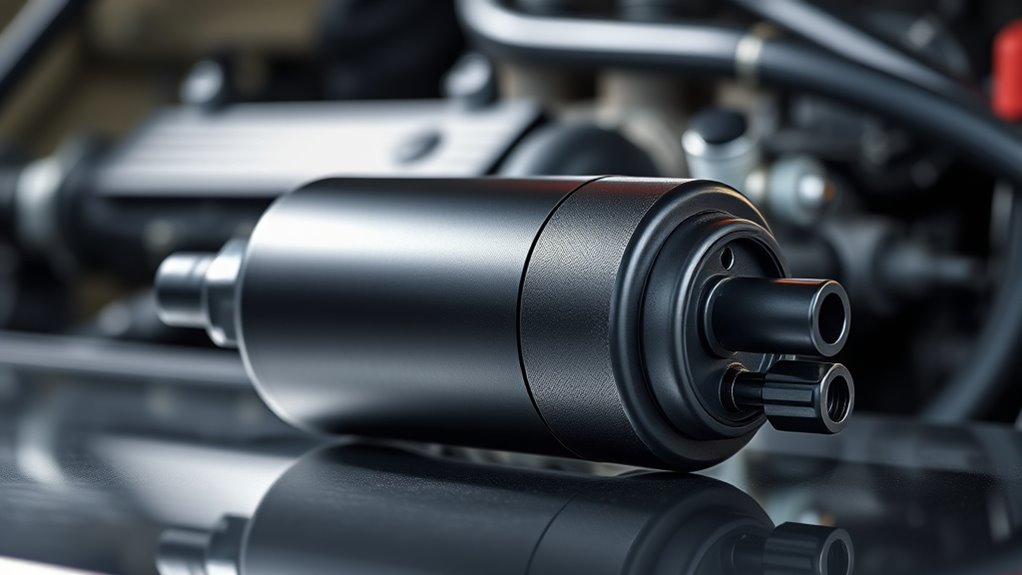
When choosing a low-pressure fuel pump, I examine how well it fits the necessary pressure range and flow rate for my configuration. I also take into account the robustness of the materials and how simple it is to install. Finally, I verify that it has a steady power source to guarantee dependable operation.
Pressure Range Compatibility
Choosing the right low-pressure fuel pump starts with ensuring its pressure range aligns with your engine’s or system’s specifications. For most low-pressure applications, this typically falls between 2.5 to 9 PSI. It’s vital to verify that the pump’s maximum pressure doesn’t exceed the capacity of your carburetor or fuel system components like float valves, which could cause flooding or overflow. If the pump’s pressure output is higher than needed, consider installing a pressure regulator to maintain safe levels. Keep in mind that some pumps may experience pressure drops under load, so choosing a pump with stable pressure ratings is essential. Matching the pump’s pressure specs to your intended use—whether for fuel transfer, auxiliary support, or replacing factory pumps—ensures reliable and safe operation.
Flow Rate Adequacy
Selecting a low-pressure fuel pump requires more than just matching pressure ratings; ensuring the flow rate aligns with your engine’s fuel needs is equally important. I always check that the pump’s flow rate, measured in gallons per hour (GPH), meets my engine’s consumption requirements. A proper flow rate prevents fuel starvation or flooding, ensuring smooth operation. Pumps with higher flow capacities are beneficial if I have long fuel lines or multiple outlets, as they help maintain consistent fuel delivery. It’s also essential to match the pump’s flow capacity to my specific application; over- or under-sizing can cause inefficiencies or pressure issues. Finally, I confirm that the flow rate is compatible with my fuel system’s needle valve and pressure limits to keep everything functioning efficiently.
Material Durability
Material durability plays a essential role in ensuring a low-pressure fuel pump’s reliable performance over time. I look for components made from metals like brass, copper, or zinc-coated cast iron because they resist rust and chemical degradation, which is crucial for longevity. Rubber and plastic parts need to be fuel-compatible and withstand temperature extremes to avoid cracking or swelling that can cause failure. The construction quality, including welds and seals, also impacts the pump’s ability to operate continuously without leaks or performance drops. Choosing a pump with durable materials means consistent fuel flow, fewer maintenance issues, and less risk of early replacement. This is especially important in demanding or long-term applications where durability directly influences reliability and cost-effectiveness.
Installation Ease
Ease of installation is a key factor to contemplate when selecting a low-pressure fuel pump, especially for DIY enthusiasts or those looking to save time. Pumps with simple two-wire connections and minimal hardware make setup straightforward, reducing frustration. Pumps designed with integrated brackets or universal fittings allow for quick attachment to various surfaces, streamlining installation. Clear inlet and outlet ports enable fast hose connections, often eliminating the need for adapters. Detailed instructions and diagrams further simplify the process, ensuring correct wiring and placement. Additionally, compact and lightweight pumps are easier to handle and fit into tight spaces, making installation more manageable. Choosing a pump with these features can substantially cut down installation time and effort, ensuring a smoother upgrade process.
Power Supply Stability
A stable power supply is vital for ensuring your low-pressure fuel pump performs reliably. Fluctuations in voltage can cause inconsistent fuel flow or even pump failure. In a 12V system, drops below 12V—often due to high current draw or poor wiring—reduce pump performance, leading to inadequate fuel delivery. To prevent this, use properly rated fuses and relays to protect the system and maintain voltage stability. Ensuring a clean, reliable power source with minimal electrical noise is also indispensable. Voltage drops caused by faulty connections or high electrical demand can cause intermittent fueling issues. By prioritizing a stable power supply, you’re ensuring your fuel pump operates efficiently and consistently, avoiding performance hiccups and extending its lifespan.
Application Suitability
Choosing the right low-pressure fuel pump depends on matching its specifications to your system’s needs. First, confirm the pump’s maximum pressure aligns with your engine’s requirements, usually between 2.5 to 9 PSI for low-pressure systems. Next, verify the flow rate; typically, 30 to 35 GPH suits small engines or carbureted setups. Compatibility with your fuel type—gasoline or diesel—is vital, and avoid pumps designed for high-pressure or fuel-injected systems. Check that inlet and outlet connections fit standard hose sizes like 5/16 inch or 8 mm for easy installation. Finally, consider the pump’s mounting options and whether it can be installed comfortably within your available space. Proper matching guarantees reliable performance and avoids potential system issues.
Longevity Expectations
The longevity of a low-pressure fuel pump depends largely on its build quality and how well it’s maintained. Pumps made with durable materials like copper, brass, or stainless steel tend to last longer, offering better resistance to wear and corrosion. Proper installation is also essential; secure mounting and correct wiring can prevent early failures. Operating conditions play a vital role—continuous use in high temperatures, exposure to contaminants, or exceeding duty cycle limits can shorten a pump’s lifespan. Regular maintenance, such as inspecting filters, replacing them when needed, and checking for leaks, can considerably extend the pump’s functional life. While some pumps may last only months, well-chosen, quality models under good conditions can perform reliably for several years.
Frequently Asked Questions
How Does Fuel Pump Durability Vary Across Different Vehicle Types?
Fuel pump durability really depends on the vehicle type. I’ve noticed that trucks and larger vehicles often have more robust pumps to handle heavier loads, so they last longer. In contrast, smaller cars with less demanding engines might experience quicker wear. Factors like driving habits and maintenance also play a role. Overall, choosing the right pump for your vehicle’s needs and maintaining it properly guarantees better longevity.
What Maintenance Is Required for Low-Pressure Fuel Pumps?
Did you know that regular maintenance can extend a fuel pump’s lifespan by up to 50%? I recommend checking the fuel filter every 20,000 miles and replacing it if dirty. Keep an eye on engine performance and listen for whining noises, which could indicate issues. Also, make certain the fuel tank stays clean and always use high-quality fuel. These simple steps help keep your low-pressure fuel pump running smoothly.
Can These Pumps Handle Ethanol-Blended Fuels Effectively?
Yes, many low-pressure fuel pumps can handle ethanol-blended fuels effectively. I look for pumps specifically rated for ethanol compatibility because ethanol can be corrosive and cause material degradation. It’s important to choose a pump made with ethanol-resistant materials like certain plastics or stainless steel. Regularly inspecting and cleaning the pump also helps prevent issues caused by ethanol, ensuring reliable performance over time.
What Are Signs of a Failing Low-Pressure Fuel Pump?
You bet your tank it’s failing when your engine sputters, stalls, or struggles to start. Sometimes, you’ll notice a whining noise from the fuel pump or inconsistent fuel pressure. If your fuel efficiency drops unexpectedly or there’s a strong smell of fuel, those are dead giveaways. Ignoring these signs only worsens the problem, so keep an eye out—your car’s health depends on it.
Are Aftermarket Fuel Pumps Compatible With Factory Fuel Systems?
Yes, aftermarket fuel pumps can be compatible with factory fuel systems, but it’s not always guaranteed. I always check the specifications and verify the pump matches your vehicle’s pressure and flow requirements. Sometimes, you might need additional fittings or adapters. It’s best to consult with a professional or do thorough research to avoid any compatibility issues and ensure reliable performance.
Conclusion
Did you know that a reliable low-pressure fuel pump can extend your vehicle’s lifespan by up to 20%? Choosing the right pump isn’t just about performance; it’s about peace of mind on every trip. With options like self-priming and universal kits, you’re covered no matter your needs. Investing in quality guarantees smoother starts and fewer breakdowns. Trust me, the right fuel pump makes all the difference—don’t settle for less when it comes to your vehicle’s health.
